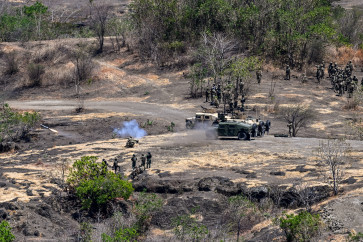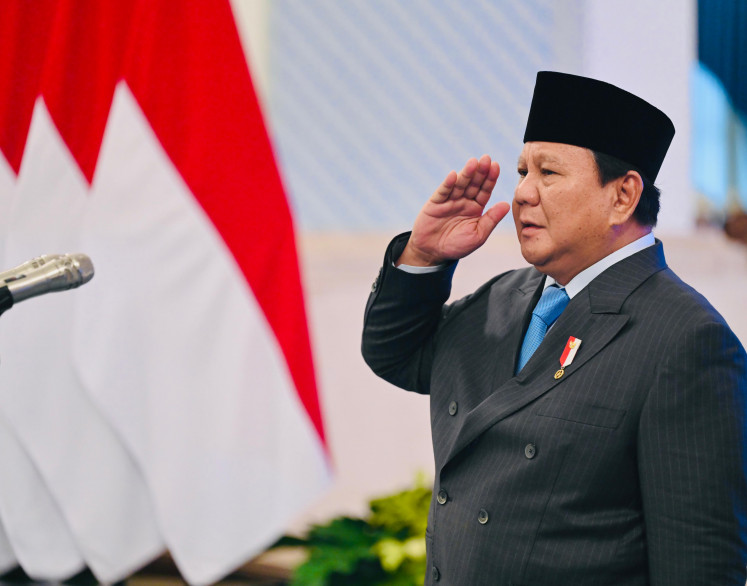Popular Reads
Top Results
Can't find what you're looking for?
View all search resultsPopular Reads
Top Results
Can't find what you're looking for?
View all search resultsJapan seeks to become model on renewable energy development
Japan is pushing ahead with its renewable energy initiative driven by world shifts in supply and demand of fossil fuels, concerns over global warming and the country’s lack of natural energy resources
Change text size
Gift Premium Articles
to Anyone
J
apan is pushing ahead with its renewable energy initiative driven by world shifts in supply and demand of fossil fuels, concerns over global warming and the country’s lack of natural energy resources.
Called the Fuskushima New Energy Society Initiative, first introduced in 2016, the project aims to create a pioneering model in Fukushima prefecture as a future renewable and hydrogen energy society.
“As you might well know Japan does not have energy resources. We don’t have oil. We don’t have coal. We don’t have gas. Therefore, we are very much concerned about our energy security,” Misako Takahashi, director of the economic security division with the Ministry of Foreign Affairs told a group of invited journalists on Monday.
“In 1970, when Japan began economic reconstruction after the Second World War, our dependence on fossil fuel was 94 percent at highest. But after the oil shock in 1974, when Organization of Petroleum Exporting Countries (OPEC) decided to continue an embargo on states they considered to help Israel, we began to decrease our dependence on fossil fuel,” she said.
“We introduced nuclear energy, becoming a significant source of energy until 2011 when the Fuskushima nuclear power plant disaster happened,” she added.
The disaster, which claimed more than 2,000 lives, prompted a shift in the country’s sources of energy supply after nuclear reactors across the country were shut down. This was marked by an increase in fossil fuel dependency from 62 percent in 2010 to 86 percent in 2014.
Natural gas played an important role in Japan’s energy needs in the absence nuclear energy.
“Japan turned to foreign countries endowed with energy resources such Malaysia, Indonesia, Qatar and others,” Takahashi said.
Data from 2015 shows Japan imported a total of 88.05 MT per year, with Indonesia being the fifth largest supplier after Australia, Malaysia, Qatar and Russia.
In oil supply, Indonesia made up 2 percent of the total 3.37 million barrels per day required, compared to Saudi Arabia’s 33 percent and United Arab Emirates’ 25 percent, both being the top suppliers.
Meanwhile in coal shipments, Indonesia was the second largest provider for Japan after Australia.
With the United States rising as an energy supplier and beginning to export LNG to Japan since the end of last year, the latter believed that collaboration between the two countries in forming a liquid and transparent LNG market in the Asia-Pacific region will contribute to promoting global free trade.
“Approximately, 90 percent of primary energy resources and the majority of key minerals are imported. That’s why we place high priority on keeping a transparent global energy market to ensure Japan’s energy security,” Takahashi said.
At the same time, she said, Japan had to address world concerns regarding climate change. The Paris Agreement has encouraged the country to pursue low-carbon, environmentally friendly technologies in power generation.
“Energy efficiency needs to be explored. Renewable energy needs to be employed and new energy systems need to be introduced,” she said.
As part of the country’s energy diplomacy, Japan is active in initiating world forums that address zero-emission of greenhouse gases. One gathering on the issue is the Innovation for Cool Earth Forum (ICEF), which will commence its two-day meeting on Wednesday.
The forum, which was launched by Prime Minister Shinzo Abe, provides a platform to promote discussion and cooperation among researchers, business and policy makers from around the world in addressing climate change through innovation in energy and environmental technologies, including their wider dissemination to business and the public.










